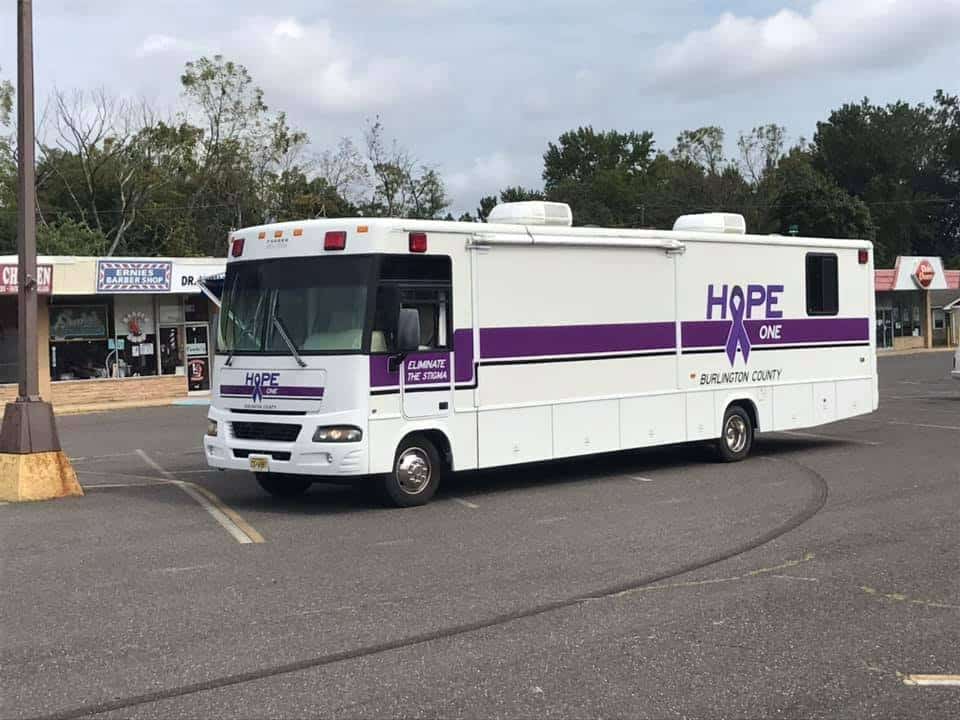

Hope is often lacking when a person is scraping the change bottle for enough money to get one more fix.
The next day is no better, and the path to homelessness, destitution and helplessness overwhelms any desire to seek help. But in Burlington County, help arrives in the back streets of every town when the Hope One van from Maryville Inc. rolls in and reaches out to those struggling with addiction.
“The Hope One van travels to places where the target population is living or spending time. Meeting hard-to-reach populations where they are – geographically, mentally, physically and at their level of need and willingness – is crucial to engaging people,” Maryville Chief Executive Officer Kendria McWilliams said.
“The Maryville staff builds trust, which can look very different from person to person,” she added. “Some may be ready to accept help, and a kind face and encouraging words from staff who can offer the resources to help are the beginning to a road to wellness for many.”
The Burlington County Board of Commissioners has renewed a contract with Maryville Inc. to continue its mobile outreach. Last year, the Hope One van provided close to 1,900 services to 832 individuals and families.
“Burlington County Hope One has been a game-changer in our fight against the addiction epidemic by bringing services, education and resources directly into our communities where people live and work, rather than asking those in need of help to go searching for them,” said Commissioner Felicia Hopson, liaison to the Burlington County Department of Human Services and the Health Department.
“We’re proud of the unit’s success, and Maryville and its staff have been a major part of it, so we’re pleased to have them continue their service.”
To provide help to those struggling, McWilliams noted, “The Hope One van travels to public transit stations, Department of Human Services’ offices, shopping malls, public parks, health fairs, libraries, food pantries and other areas where people who may need services are located.
“We publish a monthly schedule of locations we will visit,” she added. “We receive multiple requests for van service stop locations, which we honor every month.”
Among reasons for the program’s success is that Maryville has experienced Certified Senior Addictive Disease counselors (CADC) and Certified Peer Recovery specialists (CPRS) available on the van.
“These staff are experts in providing prevention, harm reduction, substance use and co-occurring disorder treatment referrals, assistance with obtaining personal identification, housing placements for the homeless, linkages to HIV, domestic violence, chronic and acute physical health problems, and justice system related issues,” McWilliams said.
As for the future, “We have recommended some exciting new outreach and prevention options, and the county and our team is discussing them,” she added.
The Hope One unit is a partnership between the county sheriff’s department and its Department of Human Services. Undersheriff Jim Kostoplis said Hope One is a tremendous community resource that has helped thousands of residents.
“As law-enforcement officers, we’re sworn to protect and serve,” he noted. “Too often, people think of the first part and not the second. We want to help get those suffering from mental illness or addictions the help and support they need, and that’s exactly what Hope One does.”
Maryville has offered services on Hope One since the program started in 2019. The nonprofit has also operated the county’s Post House treatment center since 2018, according to county Public Information Officer David Levinsky. Funding for the Maryville contract – estimated at $49,426 – is provided by the New Jersey Division of Mental Health and Addiction Services.
This summer, the county was awarded a $500,000 grant from the U.S. Department of Health and Human Services to help equip the Hope One unit with more Naloxone supplies and to train additional recovery coaches, Levinsky said.









